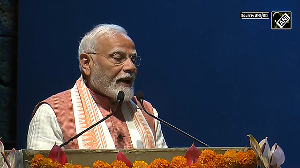The head of Italian sports car maker Ferrari says the future of Formula One will be decided next year and that manufacturers could walk away if they are unhappy with any deal.
Ferrari President Luca di Montezemolo told Germany's Welt am Sonntag newspaper there would be "no war or rival races" after 2007 when the contracts governing Formula One end, but reiterated manufacturers want a big share of future revenues.
The future of Formula One is in the air after a court ruled earlier this month in favour of three banks contesting Bernie Ecclestone's grip on the sport via a series of family holdings.
Bayerische Landesbank, JP Morgan and Lehman Brothers control 75 percent of the SLEC holding company that owns the commercial rights to Formula One. The rest is owned by Bambino Holdings, an Ecclestone family trust.
In a separate interview in Der Spiegel magazine, SLEC chairman Gerhard Gribkowsky of Bayerische Landesbank, said the banks took the threat of a breakaway championship seriously and were interested in reaching a deal with constructors.
"From 2008 there will only be one Formula One World Championships and the decision on this will fall in 2005," di Montezemolo was quoted as saying.
"I know that Ecclestone has certain rights in relationship to the Formula One name but that's not a problem for me.
"But whoever rules over the new Formula One must know that there must be big changes to profit sharing and the say of the teams and manufacturers.
"If there's no solution then from 2008 there will be a new series organised on our behalf."
Di Montezemolo said he was not clear whether the banks or Ecclestone were in control of the sport. He aimed to speak to Ecclestone before the end of the year.
Manufacturers have proposed appointing a management company between the shareholders and the teams but this must be accompanied by other changes, he said.
His goal was for 80 percent of revenue to be shared between teams and manufacturers, compared with around 45 percent at present.
SLEC chairman Gribkowsky told Der Spiegel constructors should have a say in how many Formula One races there were and where, saying this should be driven by business interests.
"The moves into China and Bahrain were without doubt right," he said. "It would be desirable to also go to Russia and India. With only two races in North America we are under-represented in comparison with the purchasing power.
"Our aim is to guarantee the sport's long-term stability. At some point the time may come when we say 'okay, we're leaving again'.
Asked when such a decision might fall, he said: "From today's point of view, in three to five years. Not earlier."








 © 2025
© 2025